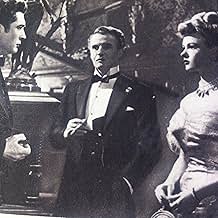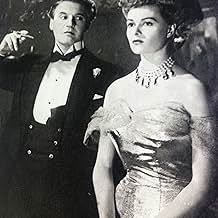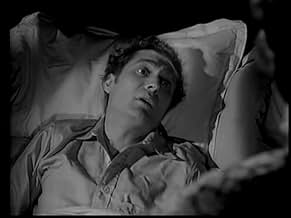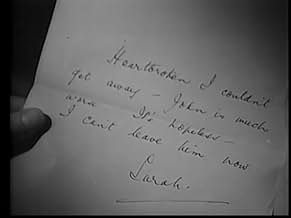VALUTAZIONE IMDb
6,1/10
179
LA TUA VALUTAZIONE
Un'attraente ragazza francese scatena la rivalità tra due fratelli quando sposa il più giovane.Un'attraente ragazza francese scatena la rivalità tra due fratelli quando sposa il più giovane.Un'attraente ragazza francese scatena la rivalità tra due fratelli quando sposa il più giovane.
- Regia
- Sceneggiatura
- Star
Therese Giehse
- Sister Seraphine
- (as Therèse Giehse)
Maureen Delaney
- Daisy Cobb
- (as Maureen Delany)
Jean Anderson
- Extra
- (non citato nei titoli originali)
Jean Bowler
- Second Programme Seller
- (non citato nei titoli originali)
Recensioni in evidenza
By the time of this film Eric Portman was in danger of becoming a caricature.When he runs up the stairs to see his brother I thought he was going to disappear inot a flash of smoke.His performance in the courtroom scene has to be seen to be believed.I think that if the role had been played by someone less stereotyped there is a possibility it might have worked,as it is you can guess what will happen next.
If for no other reason, I suggest checking this film out to watch Eric Portman do an excellent job of acting, as the diabolical Richard Howard. At the start, sympathies are with him, as he appears to be overshadowed by his brother John, who runs the family business and marries Sarah, the woman Richard wanted. That marriage is far from a paradise, and Richard appears to be the sympathetic friend, encouraging Sarah to be herself, not let John browbeat her, and pursue her own interests. John, for his part, comes across as domineering and overbearing, even abusive. Soon, Sarah's filing for divorce, but then has a change of heart. That's when all the trouble begins! (No need to go into detail, I'm sure you can tell from the title what's going to happen.)
The movie's based on the real-life story of Florence Maybrick, accused of murdering her husband, but in movieland, based on tends to mean little fact and lots of fiction, so I'm sure there are better sources for Ms. Maybrick's actual story.
What makes this movie especially worthwhile is the courtroom scene, where Mr. Portman puts on quite a performance, as he defies the judge and courtroom etiquette while attempting to clear his sister-in-law's name. By helping her, he's actually helping himself, and as his plans go awry, he begins to unravel.
As for the rest of the actors and the storyline itself, I'd say it's about average. You won't feel you've wasted your time, but if not for Mr. Portman, you could do without watching.
The movie's based on the real-life story of Florence Maybrick, accused of murdering her husband, but in movieland, based on tends to mean little fact and lots of fiction, so I'm sure there are better sources for Ms. Maybrick's actual story.
What makes this movie especially worthwhile is the courtroom scene, where Mr. Portman puts on quite a performance, as he defies the judge and courtroom etiquette while attempting to clear his sister-in-law's name. By helping her, he's actually helping himself, and as his plans go awry, he begins to unravel.
As for the rest of the actors and the storyline itself, I'd say it's about average. You won't feel you've wasted your time, but if not for Mr. Portman, you could do without watching.
Sally Gray weds Patrick Holt, which gives him control over her fortune. When she discovers he's been carrying on an affair, she Investigates a divorce, but it's impossible. However, when it turns out that someone sends Holt a letter that she had run into Dermot Walsh at the lawyers and was seen walking around London with him, his Victorian sense of propriety is offended, and he strikes her. There's a rapprochement, and then he falls ill, is poisoned by his jealous brother Patrick Holt, and dies. Miss Gray goes on trial for the murder.
It's based on an actual murder case, the trial of Florence Maybrick, although those are not the facts of this movie, which is full of men with thundering tempers, an utterly innocent Miss Gray, and loyal servants: just the sort of fillum calculated to appeal to an audience who had made THE MAN IN GREY such a hit a few years before. Brian Desmond Hurst directs capably, but without much conviction.
It's based on an actual murder case, the trial of Florence Maybrick, although those are not the facts of this movie, which is full of men with thundering tempers, an utterly innocent Miss Gray, and loyal servants: just the sort of fillum calculated to appeal to an audience who had made THE MAN IN GREY such a hit a few years before. Brian Desmond Hurst directs capably, but without much conviction.
Beautiful young Sarah Bonheur is enchanted by the cultured Richard Howard who is visiting her château near Bordeaux on a business trip. But Richard suffers his latest and most devastating humiliation by his dominant younger brother John who takes the deal out of Richard's hands and captures the affections of Sarah whom he marries and takes back to Manchester.
But Sarah, despite her best efforts, finds married life in John's gloomy mansion lonely and depressing and turns to Richard for advice. Now fired with hatred and jealousy toward his brother, he does his best to break up the marriage, but is ultimately unsuccessful.
John now falls ill and Richard poisons him, slyly exploiting the latent hostility of the household's servants toward Sarah in framing her for the crime...
This powerful drama is an interesting example of a strand of late 1940s British cinema, but has been long neglected and not shown on British TV for many years, if at all. Set in the late Victorian and early Edwardian eras, it has excellent period detail and the sets effectively highlight Sarah's alienation and despair in the Howards's suffocating and gloomy household.
The director ensures that the film never drags, not something that can be said of all of his work, and it has a sympathetic score from Bernard Stevens, though the sinister chords that greet Richard's appearances are perhaps overdone. Star Eric Portman is memorable in this role, though tends to overact in the crucial courtroom scene. This was becoming a familiar type of role for him at the time, and perhaps contributed to contemporary critics antipathy to the film. His nemesis provides an early part for the likable Dermot Walsh, while the adorable Sally Gray provides a sensitive and intelligent performance as Sarah in a production which underlines the oppressive treatment of women at the turn of the last century.
But Sarah, despite her best efforts, finds married life in John's gloomy mansion lonely and depressing and turns to Richard for advice. Now fired with hatred and jealousy toward his brother, he does his best to break up the marriage, but is ultimately unsuccessful.
John now falls ill and Richard poisons him, slyly exploiting the latent hostility of the household's servants toward Sarah in framing her for the crime...
This powerful drama is an interesting example of a strand of late 1940s British cinema, but has been long neglected and not shown on British TV for many years, if at all. Set in the late Victorian and early Edwardian eras, it has excellent period detail and the sets effectively highlight Sarah's alienation and despair in the Howards's suffocating and gloomy household.
The director ensures that the film never drags, not something that can be said of all of his work, and it has a sympathetic score from Bernard Stevens, though the sinister chords that greet Richard's appearances are perhaps overdone. Star Eric Portman is memorable in this role, though tends to overact in the crucial courtroom scene. This was becoming a familiar type of role for him at the time, and perhaps contributed to contemporary critics antipathy to the film. His nemesis provides an early part for the likable Dermot Walsh, while the adorable Sally Gray provides a sensitive and intelligent performance as Sarah in a production which underlines the oppressive treatment of women at the turn of the last century.
Eric Portman (Richard) is out in France carrying out a business deal and wooing Sally Gray (Sarah) when his bother Patrick Holt (John) shows up and pinches his girlfriend! More than that, he marries her. Guess what, Portman bears a grudge over this - what a surprise, eh? We jump forwards and Gray is not happy at home with Holt. He's horrible to her and Portman shows up with a plan to rescue her and win his girlfriend back for himself. Oh dear, she's not interested in a romantic liaison and even has another interest - Dermot Walsh (Thorn) on the go. Portman has another plan - and it's a bit more sinister.
This film is ok but lacking in any real tension and I also have to add that it contains the rare occasion where Portman overacts which is to his detriment. His courtroom ramblings are almost laughable due to his delivery. The story is ok but it is told as a straight narrative without fully engaging the audience with scenes that play on the emotions. Neither of the brothers are particularly pleasant but it is fun to follow Portman and his scheming. In fact, I kind of supported Portman in what he was up to. So, I guess I must be evil as well.
This film is ok but lacking in any real tension and I also have to add that it contains the rare occasion where Portman overacts which is to his detriment. His courtroom ramblings are almost laughable due to his delivery. The story is ok but it is told as a straight narrative without fully engaging the audience with scenes that play on the emotions. Neither of the brothers are particularly pleasant but it is fun to follow Portman and his scheming. In fact, I kind of supported Portman in what he was up to. So, I guess I must be evil as well.
Lo sapevi?
- QuizFilm debut of William Mervyn.
- Citazioni
Richard Howard: They'll come for Sarah. She will suffer - she should suffer. She'll find out which one of us she should've married. But she won't hang - I'll see to that, I'll save her. But I'll have her at my feet, grateful, humble, willing.
John Howard: Sarah - at your feet? Not this side of eternity.
I più visti
Accedi per valutare e creare un elenco di titoli salvati per ottenere consigli personalizzati
Dettagli
- Tempo di esecuzione1 ora 28 minuti
- Colore
- Proporzioni
- 1.37 : 1
Contribuisci a questa pagina
Suggerisci una modifica o aggiungi i contenuti mancanti

Divario superiore
By what name was Il marchio di Caino (1947) officially released in Canada in English?
Rispondi

































